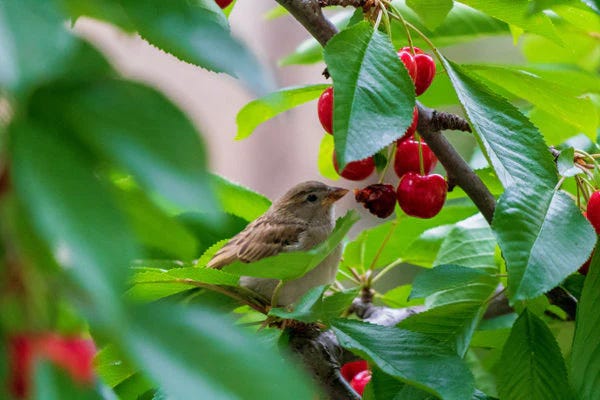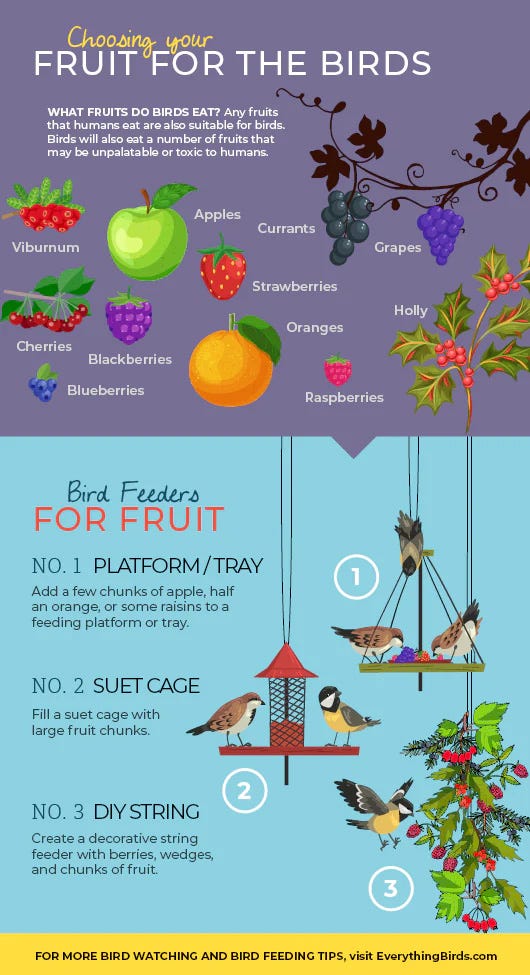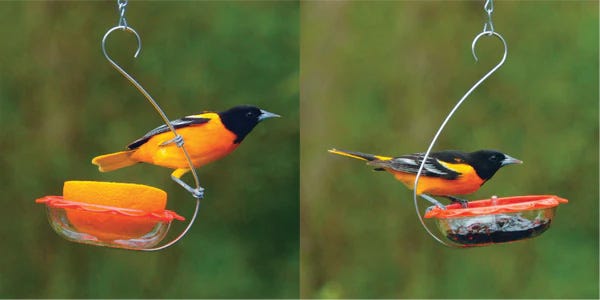Dou Chop Up Oranges When Feeding Birds
Fruit is an attractive and nutritious addition to any bird feeding station. Many birders are surprised at the different bird species that happily sample fruit at feeders. There are several ways you can feed birds fruit in your yard and enjoy a more diverse flock of feathered guests.
Birds That Eat Fruit
Many different species of birds eat fruit. If the majority of their diet is fruit-based, the birds are considered frugivores, or frugivorous. Other birds adapt their diets seasonally and may eat more fruit in late summer or autumn when fruit is naturally more abundant and easily available. In winter, fruit that is still clinging to trees and bushes can be an easy food source for hardy species that stay in northern regions. The most familiar birds that regularly eat fruit include:
- Catbirds
- Grosbeaks
- Orioles
- Robins
- Tanagers
- Thrashers
- Thrushes
- Waxwings
- Woodpeckers
In addition to these fruit-loving birds, other species such as warblers, kinglets, titmice, sparrows, quail, and towhees will occasionally nibble on fruit, especially when other foods may be scarce or fruit is widely available. In tropical habitats, species such as toucans and parrots may have diets almost entirely comprised of fruit.

What Fruits do Birds Eat?
Any fruits that humans eat are also suitable for birds. Birds will also eat a number of fruits that may be unpalatable or toxic to humans. Berries and small fruits, including blueberries, raspberries, currants, blackberries, mulberries, beautyberries, serviceberries, sumac, holly, juniper, and viburnum are especially popular with many birds. Birds also enjoy other fruits such as oranges, plums, apples, grapes, cherries, crabapples, and prickly pear.
Birds may swallow small fruits whole, and any seeds that are defecated could regrow into new plants for future fruit crops. Larger fruits may be pierced, shredded, or torn for birds to reach the flesh. Some birds will sip the juice from watery fruits such as citrus. Birds may eat fruits before they are fully ripe, and many birds will nibble on fruits long after they've become overripe, and even fermented. There are even numerous reports of fruit-loving birds gorging on fermented fruits to the point of intoxication!

Feeding Birds Fruit in Your Yard
It is easy to offer both natural and supplemental fruit sources to the birds in your yard. Planting native vines, berry bushes, and fruit trees will ensure an ongoing supply of fruit from year-to-year. Be sure to choose fruit varieties with different ripening seasons to give your birds a lasting food source. Minimize any chemical treatments on the plants, including herbicides, insecticides, and pesticides. If you want some fruit for your own harvests, take steps to protect some bushes or branches from birds' attention well before the fruit ripens, but leave old and windfall fruits available for birds after the fruit has ripened.
See also: How Birds Help Your Garden
Adding fruit to bird feeding stations can be as simple as adding a few chunks of apple, half an orange, or some raisins to a feeding platform or tray. You can also fill a suet cage with large fruit chunks, or create a decorative string feeder with berries, wedges, and chunks of fruit. Small dried fruits, such as cranberries, raisins, or currants, ought to be soaked or moistened before being offered to birds. Never offer any fruits with candy or chocolate coatings, seasonings, or spices, which do not appeal to birds and could even be toxic or otherwise unhealthy. Fruit rinds with juicy bits still clinging to the skin can even be tossed out for birds to nibble on.
Jelly is another way to feed birds fruit, but it should be done cautiously. While fresh fruit jellies—or simply crushed up fruits—do appeal to birds, jelly brands with a great deal of added sugar, preservatives, and other chemicals are less suitable to birds and should only be offered in limited quantities. Do not offer birds any sugar-free jellies, as they do not have the nutritional composition birds need for adequate energy.

More Tips for Feeding Birds Fruit
As with any bird feeding, the feeders you use for feeding birds fruit need to be kept clean and fresh. Fruit should be discarded before it is moldy in the feeder. Very rotted windfall fruit should be collected and discarded as well. Be aware that other wildlife may happily visit fruit-filled feeders as well, including raccoons, squirrels, and opossums. If you prefer to minimize their visits, do not overfill feeders—or bring feeders in at night so they cannot be accessed instead. Using baffles can also help deter other wildlife from raiding fruit-filled feeders.
Feeding birds fruit can be a great way to increase the visitor diversity at your feeding stations. Just as the birds enjoy the colorful fruits you offer, you will enjoy the colorful birds that take advantage of your fruity hospitality.
See also: How to Successfully Squirrel-Proof Your Bird Feedesr
fergusonthateled39.blogspot.com
Source: https://www.perkypet.com/articles/a-guide-to-feeding-birds-fruit
0 Response to "Dou Chop Up Oranges When Feeding Birds"
Post a Comment